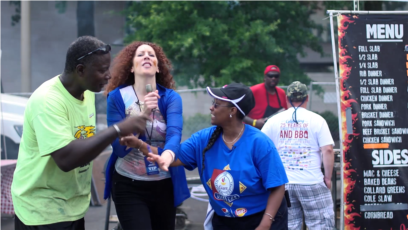Anna goes to a barbecue battle in Washington, D.C. She learns that
there are secret ingredients in the sauces. And people are VERY loyal to
their favorite kind of barbecue.
Anna tới dự một "cuộc chiến thịt nướng" ở Washington, D.C. Cô ấy học
được có nhiều nguyên liệu bí mật trong sốt ăn kèm. Và mọi người thì RẤT
trung thành với loại sốt thịt nướng yêu thích của họ.
Anna: Thanks for meeting me.
Kelly: Sure.
Anna: I’d like to get your advice on my latest project.
Kelly: Of course. I heard you were sent to cover a big food festival that has all kinds of barbecue. So, how did it go?
Anna: Well, things started out great! But then, well, maybe you should watch it yourself.
Prof. Bot: Hi English learners! Your lesson today is about my
favorite food -- barbecue! Your assignment is to find passive
sentences. What are those, you might ask? In passive sentences the
subject receives the action!
For example, “Anna was sent to cover a food festival.”
Passive sentences have a form of the BE verb + the past participle of
the main verb. This lesson is LOADED with passive sentences. Hey!
That’s a passive sentence, too!
Okay, now, it’s Barbecue Time!
Anna: Today, a Barbecue Battle is being held in
Washington, D.C. This festival, which is known as one of the biggest
food festivals in the United States, brings together barbecue lovers
from all over the country! Barbecue is meat that is cooked over an open
fire or on a grill.
Chicken, pork and beef are all common meats to grill on a barbecue! No matter which meat you like to barbecue, the sauce is very important. Sauces are taken very seriously by chefs. Most ingredients are kept secret!
So, can you tell us what is in your barbecue sauce?
Chef 1: No, I can’t tell you.
Anna: So, tell us, what is the secret ingredient in your barbecue sauce?
Chef 2: (says nothing.)
Anna: Sauces are made by the barbecue chefs themselves. Most sauces are made with a tomato sauce, vinegar, and spices.
Prof. Bot: How many passive sentences did you find? Here is one I found:
Today, a Barbecue Battle is being held on the National Mall in
Washington, D.C. Now you try. Turn this sentence from passive to active.
Barbecue is loved by Prof. Bot.
Professor Bot loves Barbecue!
Good job! And yes, I do.
Anna: There are some areas of the U.S. that are known for their tasty
barbecue. The states of Texas, North and South Carolina and the cities
of Memphis and Kansas City are known as the Barbecue Belt. People who
are loyal to barbecue are really loyal to
their favorite barbecue. That is why this festival is called a battle!
Let’s ask a couple of people which barbecue is best.
Person 1: Texas, of course!
Person 2: Carolina barbecue is the very best.
Person 3: Kansas City!
Person 4: Memphis style!
Person 3: Kansas City!
Person 5: Texas!
Person 3: Kansas!
Person 5: Texas!
Person 3: Kansas!
Person 5: Texas!
Person 3: I say Kansas.
Person 5: Texas!
Person 3: She keeps saying Texas, I say Kansas.
Anna: This is Anna Matteo reporting.
Anna: Kelly, people feel so strongly about barbecue. Unbelievable! So, what do you think of my project?
Kelly: This is what I think. There is no way that Texas has the best
barbecue. I am from Kansas City and we have THE best barbecue in the
whole country. My mother and father owned a barbecue restaurant, which
was really famous! So, I know barbecue! Anna, I know barbecue! I know
barbecue! I know barbecue!
Prof Bot: Oh my. Kelly knows a lot about barbecue! And you know more
about passive sentences! Be sure you go to the website to learn even
more! Ah! Now, if you excuse me .. I'm hungry
Từ ngữ mới (New Words)
barbecue - n. a flat metal frame that is used to cook food over hot coals or an open fire
barbecue - v. to cook (food) on a barbecue or to broil or roast (meat, fish, etc.) over hot coals or an open fire
battle - n. a fight between people or groups in which each side tries to win a contest (such as a game or an election)
brown sugar - n. a type of sugar that is brown because it contains a dark syrup (called molasses)
chef - n. a professional cook who usually is in charge of a kitchen in a restaurant
grill - n. a metal frame that is used to cook food over hot coals or an open fire
- v. to cook (food) on a metal frame over fire
loyal - adj. having or showing complete and constant support for someone or something
molasses - n. a thick, brown, sweet liquid that is made from raw sugar
sauce - n. a thick liquid that is eaten with or on food to add flavor to i
spice - n. a substance (such as pepper or
nutmeg) that is used in cooking to add flavor to food and that comes
from a dried plant and is usually a powder or seed
spicy - adj. of food. flavored with or containing strong spices and especially ones that cause a burning feeling in your mouth
sweet - adj. containing a lot of sugar
tasty - adj. having a good flavor
tomato - n. a round, soft, red fruit that is eaten raw or cooked and that is often used in salads, sandwiches, sauces
vinegar - n. a sour liquid that is used to flavor or preserve foods or to clean things
Sách lược học tập (Learning Strategy)
The learning strategy for this lesson is Ask Questions. One of the best ways to learn is to ask many questions.
In this lesson, Anna asks the barbecue chefs questions like, "Where
does the best barbecue come from?" and "What is the secret ingredient in
your sauce?" She gets many opinions on the best barbecue, but she never
learns about the secret ingredient in the sauce.
How about you? How often do you ask questions as you study English?
When you are learning English, do you ask teachers, friends or
classmates to help you by sharing their knowledge? Write to us in the
Comments section or send us an email.
Bài kiểm tra Nghe (Listening Quiz)
See how well you understand this lesson by taking a listening quiz. Play each short video, then choose the best answer.
Quiz - Let's Learn English Level 2 Lesson 8: The Best Barbecue
Start the Quiz to find out























